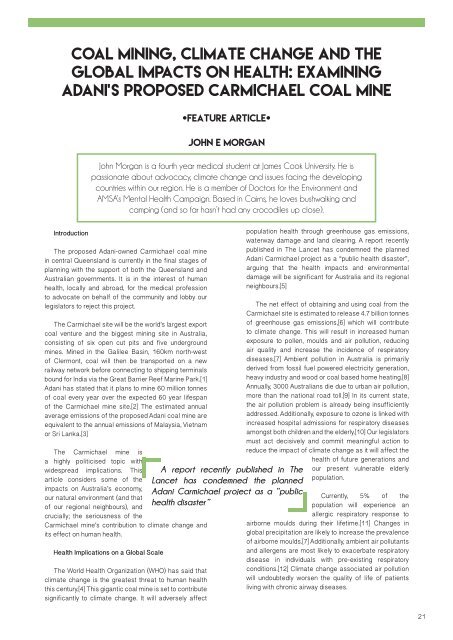Vector Volume 11 Issue 2 - 2017
Create successful ePaper yourself
Turn your PDF publications into a flip-book with our unique Google optimized e-Paper software.
Coal mining, climate change and the<br />
global impacts on health: examining<br />
Adani’s proposed Carmichael coal mine<br />
Introduction<br />
The proposed Adani-owned Carmichael coal mine<br />
in central Queensland is currently in the final stages of<br />
planning with the support of both the Queensland and<br />
Australian governments. It is in the interest of human<br />
health, locally and abroad, for the medical profession<br />
to advocate on behalf of the community and lobby our<br />
legislators to reject this project.<br />
The Carmichael site will be the world’s largest export<br />
coal venture and the biggest mining site in Australia,<br />
consisting of six open cut pits and five underground<br />
mines. Mined in the Galilee Basin, 160km north-west<br />
of Clermont, coal will then be transported on a new<br />
railway network before connecting to shipping terminals<br />
bound for India via the Great Barrier Reef Marine Park.[1]<br />
Adani has stated that it plans to mine 60 million tonnes<br />
of coal every year over the expected 60 year lifespan<br />
of the Carmichael mine site.[2] The estimated annual<br />
average emissions of the proposed Adani coal mine are<br />
equivalent to the annual emissions of Malaysia, Vietnam<br />
or Sri Lanka.[3]<br />
The Carmichael mine is<br />
a highly politicised topic with<br />
widespread implications. This<br />
article considers some of the<br />
impacts on Australia’s economy,<br />
our natural environment (and that<br />
of our regional neighbours), and<br />
crucially; the seriousness of the<br />
Carmichael mine’s contribution to climate change and<br />
its effect on human health.<br />
Health Implications on a Global Scale<br />
The World Health Organization (WHO) has said that<br />
climate change is the greatest threat to human health<br />
this century.[4] This gigantic coal mine is set to contribute<br />
significantly to climate change. It will adversely affect<br />
[Feature Article]<br />
John E Morgan<br />
John Morgan is a fourth year medical student at James Cook University. He is<br />
passionate about advocacy, climate change and issues facing the developing<br />
countries within our region. He is a member of Doctors for the Environment and<br />
AMSA’s Mental Health Campaign. Based in Cairns, he loves bushwalking and<br />
camping (and so far hasn’t had any crocodiles up close).<br />
A report recently published in The<br />
Lancet has condemned the planned<br />
Adani Carmichael project as a “public<br />
health disaster”<br />
population health through greenhouse gas emissions,<br />
waterway damage and land clearing. A report recently<br />
published in The Lancet has condemned the planned<br />
Adani Carmichael project as a “public health disaster”,<br />
arguing that the health impacts and environmental<br />
damage will be significant for Australia and its regional<br />
neighbours.[5]<br />
The net effect of obtaining and using coal from the<br />
Carmichael site is estimated to release 4.7 billion tonnes<br />
of greenhouse gas emissions,[6] which will contribute<br />
to climate change. This will result in increased human<br />
exposure to pollen, moulds and air pollution, reducing<br />
air quality and increase the incidence of respiratory<br />
diseases.[7] Ambient pollution in Australia is primarily<br />
derived from fossil fuel powered electricity generation,<br />
heavy industry and wood or coal based home heating.[8]<br />
Annually, 3000 Australians die due to urban air pollution,<br />
more than the national road toll.[9] In its current state,<br />
the air pollution problem is already being insufficiently<br />
addressed. Additionally, exposure to ozone is linked with<br />
increased hospital admissions for respiratory diseases<br />
amongst both children and the elderly.[10] Our legislators<br />
must act decisively and commit meaningful action to<br />
reduce the impact of climate change as it will affect the<br />
health of future generations and<br />
our present vulnerable elderly<br />
population.<br />
Currently, 5% of the<br />
population will experience an<br />
allergic respiratory response to<br />
airborne moulds during their lifetime.[<strong>11</strong>] Changes in<br />
global precipitation are likely to increase the prevalence<br />
of airborne moulds.[7] Additionally, ambient air pollutants<br />
and allergens are most likely to exacerbate respiratory<br />
disease in individuals with pre-existing respiratory<br />
conditions.[12] Climate change associated air pollution<br />
will undoubtedly worsen the quality of life of patients<br />
living with chronic airway diseases.<br />
21

















